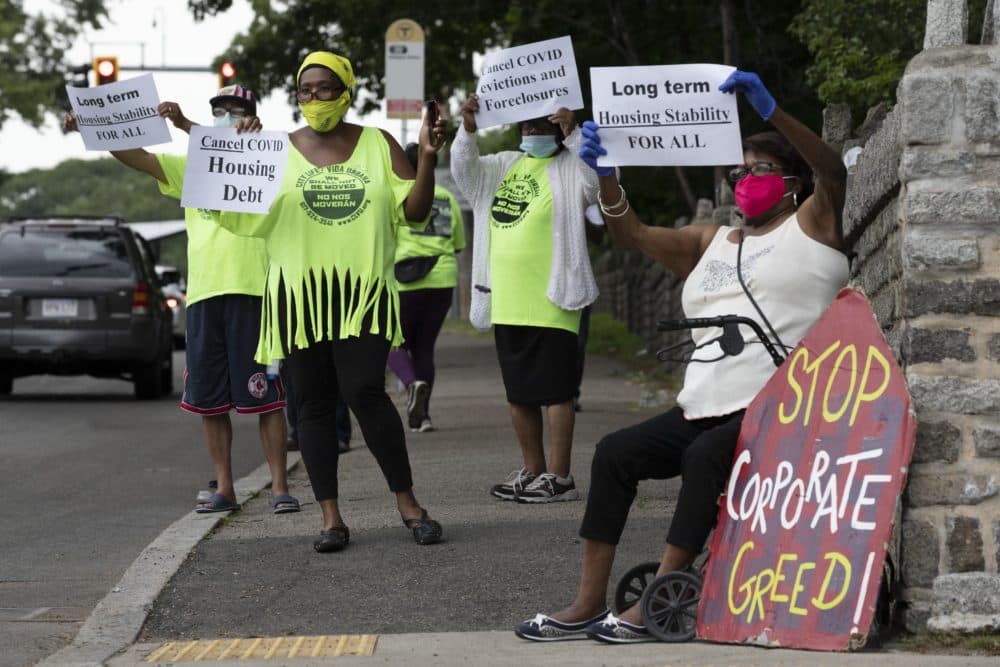Advertisement
Coronavirus Coverage
Moratorium On Evictions And Foreclosures Extended To Mid-October

Evictions and foreclosures will be paused for an additional 60 days in Massachusetts, until Oct. 17, due to the coronavirus pandemic, Gov. Charlie Baker announced Tuesday.
The moratorium was previously set to expire in less than a month, on Aug. 18. The governor was given authority to extend the moratorium in increments of up to 90 days under a state law signed in April, which created the special housing protections during the COVID-19 state of emergency.
Fearing a wave of evictions in the months to come, advocates repeatedly called upon state elected officials to extend the hold on evictions for failure to pay. Those demands increased in the last several weeks as pandemic unemployment benefits were set to end before August.
While renters may find relief in the news, the Republican governor acknowledged in his letter to legislative leaders detailing his decision that it was likely to negatively impact some landlords.
"I am aware that the extension I am declaring today will impact many small landlords who rely on rental income to pay their own expenses," Baker wrote. "I strongly encourage tenants to continue to pay rent, and homeowners to make their mortgage payments, to the extent they are able while the moratoria remain in place."
As WBUR previously reported, some landlords argued earlier that if the moratorium were extended through legislation, there should be language included to prevent tenants from refusing to pay rent in bad faith.
“We don’t expect to live for free,” said Carolina, an East Boston tenant who has been unable to pay her rent since April because she and her husband lost their cleaning jobs at the start of the pandemic. (WBUR agreed not to use Carolina’s full name because she fears repercussions related to her immigration status.)
“And we recognize that the landlords should also get help as we are,” she added in Spanish. "I’m very happy about the extension, but the landlords also have to pay their bills.”
Advertisement
That’s an arrangement that Greg Vasil, of the Greater Boston Real Estate Board, would like to see, too. He said the property owners he represents don’t want to see people getting evicted during a pandemic. But he said there has to be a federal bailout for landlords — or their woes could spiral through the economy.
“And what that’s gonna do is drive the price of everything and drive property values lower,” Vasil said. “And that comes home to roost in terms of the property taxes — they get paid by people, which affect cities and towns.”
In its statement, the Baker administration said it "will consult with the court administrators and other stakeholders regarding programs and policies to help tenants avoid eviction when proceedings resume."
Over the last several months, people on all sides of the debate found themselves agreeing that a moratorium isn't a long-term solution to the threat of an evictions surge. So far, that surge largely was kept at bay by emergency unemployment benefits, which put an extra $600 a week into people’s pockets.
But, as of now, those benefits will expire at the end of July. Knowing this, along with uncertainties about what the public health crisis will look like in the fall, some people said they remain worried about what will happen when Baker's extended moratorium expires.
“The eviction moratoriums aren’t forgiving the rent — they’re just saying that the renter can’t be evicted,” said Whitney Airgood-Obrycki, a researcher at Harvard’s Joint Center for Housing Studies. “So for a lot of cash-strapped renters in particular, it’s going to be even harder a couple of months down the line to pay several months of rent. So this eviction moratorium alone is just delaying ... this eventual wave of evictions.”
Some housing advocates even called for another extension of the evictions moratorium — past the new end date of Oct. 17. Primarily, their focus continued to be on the passage of a bill that would ban most evictions through October 2021.
Landlords repeatedly have argued that such a ban would be devastating for property owners — especially small property owners.
In his release, Baker noted that the state on July 1 announced that $20 million in emergency rental and mortgage assistance was being provided to low-income tenants and homeowners struggling to make payments.
Baker also told state legislators that he will assess whether additional state and federal resources should be devoted to housing assistance.
This article was originally published on July 21, 2020.
This segment aired on July 22, 2020.

